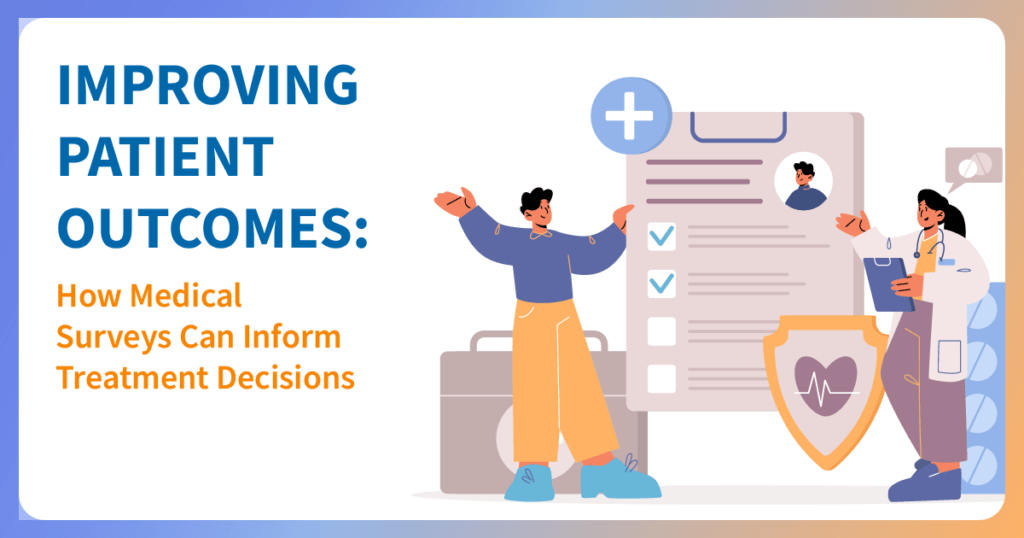
Improving Patient Outcomes: How Medical Surveys Can Inform Treatment Decisions
Every healthcare professional and organization aims for the timely use of personal health services to improve patient outcomes.
From promoting general physical and mental health to ensuring the well-being of people worldwide, improving patient outcomes has a far-fetched positive impact.
But, what exactly does it involve?
Patient outcomes include several aspects of healthcare delivery that patients value highly when seeking and receiving care, such as timely appointments, easy access to information, and good communication with healthcare providers.
Be informed that patient outcomes and patient experience are two different things. In this blog, let’s try to understand what patient outcomes are and how they can be improved with the help of medical surveys.
Improving patient outcomes: The role of medical surveys
Medical surveys can help improve patient outcomes by providing valuable information about patient experiences and perceptions of healthcare services. The use of patient-reported outcomes is an essential aspect of improving clinical care because it enhances the connections between doctors and patients (National Library of Medicine).
Medical surveys can help healthcare providers to better understand patient needs and preferences, which can lead to better communication and decision-making between doctors and patients, improving patient satisfaction and allowing doctors to provide better care at the individual patient’s level as well as in aggregate for the population3
The Role of Medical Surveys in Gathering Patient Data
Medical surveys help gather patient data that enables healthcare providers to achieve valuable insights into patient experiences and perceptions about healthcare services. This information can help healthcare providers to better understand patient needs and preferences, which can lead to better communication and decision-making between doctors and patients, improving patient satisfaction and allowing doctors to provide better care at the individual patient’s level as well as in aggregate for the population.
A study by AdventHeath University found that healthcare analytics can be extremely beneficial in delivering positive outcomes. Data analytics tools and technology, such as electronic health records (EHRs), chatbots, and data dashboards, are an integral part of the healthcare data analytics landscape
They streamline data gathering and patient scheduling, provide patient information in context rather than just as a history of medical codes, and help healthcare providers to identify areas for improvement and develop strategies to enhance the care they provide
When implemented correctly, analytics can predict outbreaks, bolster preventive care, enhance the overall quality of care that patients receive, and lessen the financial burden on healthcare systems
How survey-based data analytics has improved patient outcomes in healthcare
Data analytics has improved patient outcomes in healthcare in several ways. One example is the use of predictive analytics tools to identify patients at high risk of developing chronic conditions such as diabetes or heart disease, allowing healthcare providers to intervene before problems arise.
Another example is the use of data analytics to reduce medical errors and improve patient outcomes. By analyzing data from diagnoses and outcomes, medical prescriptions, clinical trials, billing, payments, scheduling, coding, insurance reimbursements, and more, healthcare providers can gain insights into patient behavior and health outcomes, which can inform personalized care plans and treatment recommendations.
Data analytics can also help healthcare providers to identify areas for improvement and develop strategies to enhance the care they provide. By gathering, analyzing, and understanding data, healthcare providers can identify trends and patterns that can improve patient outcomes, such as reducing hospital readmissions and improving patient satisfaction.
In summary, data analytics has improved patient outcomes in healthcare by allowing healthcare providers to identify patients at high risk of developing chronic conditions, reduce medical errors, and improve patient satisfaction. By analyzing data, healthcare providers can gain insights into patient behavior and health outcomes, which can inform personalized care plans and treatment recommendations, ultimately leading to better patient outcomes.
The advantages of using medical surveys for patient data collection in healthcare settings
Surveys are a valuable tool for gathering patient feedback and improving healthcare outcomes. Here are some advantages of using surveys in healthcare settings:
- Accessibility and ease of distribution
Surveys can be easily distributed to patients through various channels, such as email, mail, or in person. This makes it easy to collect feedback from a large number of patients, regardless of their location or health condition Source: )Patient Satisfaction Survey as a Tool Towards Quality Improvement – PMC).
- Ability to capture a wide range of patient experiences
Surveys can capture a wide range of patient experiences, including their satisfaction with the care they received, their perception of the quality of care, and their overall experience with the healthcare system. This information can help healthcare providers to identify areas for improvement and develop strategies to enhance the care they provide.
- Facilitation of evidence-based decision-making
Surveys can provide valuable data that can be used to inform evidence-based decision-making. By analyzing survey data, healthcare providers can gain insights into patient needs and preferences, which can help them to make informed decisions about how to improve patient outcomes.
Bringing it all together
In summary, surveys are a valuable tool for gathering patient feedback and improving healthcare outcomes. They are accessible and easy to distribute, can capture a wide range of patient experiences, and can facilitate evidence-based decision-making. By using surveys, healthcare providers can gain valuable insights into patient needs and preferences, ultimately leading to better patient outcomes.